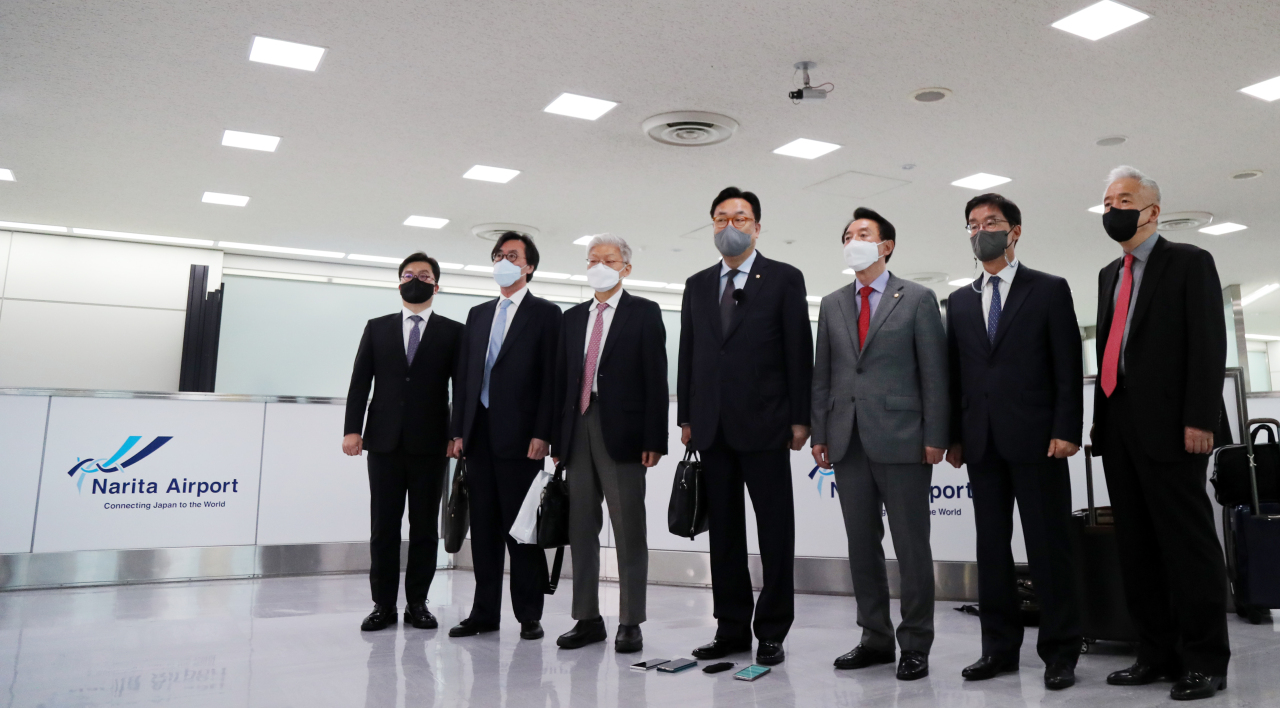Yoon’s delegation departs for Tokyo, seeks to revive long-strained relationship
Thorny issues regarding wartime history and trade remain unresolved between Seoul-Tokyo
By Jo He-rimPublished : April 24, 2022 - 14:56

President-elect Yoon Suk-yeol’s policy consultation delegation to Tokyo began its five-day trip Sunday, marking the incoming administration’s first move aimed at improving bilateral relations.
During the trip, the seven-person delegation, headed by National Assembly Deputy Speaker Rep. Chung Jin-suk of the People Power Party, will meet with Japanese authorities to discuss and coordinate policies, while seeking to revive the long-strained relationship between the two countries.
Before departing for Tokyo, Chung said the trip is aimed at laying the groundwork for starting anew.
“We are departing on this trip, as to fasten the first button for a new Korea-Japan relationship for the Yoon Suk-yeol administration,” the five-term lawmaker told reporters at Incheon Airport on Sunday.
“We will meet with various authorities of Japan and deliver the president-elect’s message that both sides should make efforts to recover and enhance the (strained) relationship between Korea and Japan that was left unattended for a long time, and for the benefits of both countries.”
The Korean delegation also carries with them a personal letter from Yoon to Japanese Prime Minister Fumio Kishida, according to the president-elect’s spokesperson Bae Hyun-jin.
Details of the delegation’s agenda have not been revealed. Seoul-Tokyo relations have remained frosty, mainly over several thorny issues regarding wartime history and trade.
The delegation chief also said his team would be starting meaningful discussion for the two countries, “recognizing how recovering the conventional alliance of Korea, the United States and Japan will contribute greatly to the peace and prosperity of the Korean Peninsula and the Northeast Asian region, as well as the world amid the continuing provocations of North Korea and the war in Ukraine creating uncertainties and changes in the world order.”
The president-elect thinks it is in Korea’s national interest to normalize the Korea-Japan relationship that was left at its worst condition, Chung added.
The delegation was set to begin its official schedule by paying tribute to Lee Soo-hyun, a Korean exchange student who died trying to save a Japanese man who fell onto a train track in Tokyo in 2001.
The tribute was “to not forget Lee’s noble sacrifice and to support the desire of the deceased, and to take a step forward to thaw the frozen relationship of the two countries,” Yoon’s spokesperson said in a regular press briefing.
According to Yoon’s office, the policy consultation delegation is arranging a meeting with the Japanese prime minister. It is likely to be held on Wednesday, according to local reports here.
If the meeting is arranged, the delegation is also expected to invite Kishida to Yoon’s presidential inaugural ceremony, slated for May 10.
Yoon’s delegation of seven Japan and foreign affairs experts is also expected to meet with Japanese Foreign Minister Yoshimasa Hayashi and the two most recent former prime ministers, Shinzo Abe and Yoshihide Suga.
Rep. Kim Seok-ki, who is the vice chair of the Korea-Japan parliamentary diplomacy forum, is the deputy chief of the delegation. Other members include Yun Duk-min, former chancellor of the Korea National Diplomatic Academy, and Park Cheol-hee, a professor of Japanese politics at Seoul National University’s Graduate School of International Studies who assisted Yoon in forming his foreign policy pledges.
Lee Sang-deok, a former Korean ambassador to Singapore, also joined the delegation. Lee had led working-level negotiations on the controversial agreement on Japanese military’s sexual slavery issue during the Japanese colonial era, when he was serving as the head of Northeast Asian affairs at the Foreign Ministry in 2015. Kishida was serving as Japan’s foreign minister at that time.
It is the president-elect’s second policy consultation delegation sent abroad, following the first to the United States earlier in the month.
Issues that keep Seoul and Tokyo at odds with each other are ongoing, with the latest development taking place just last week.
On Friday, Korea’s Foreign Ministry lodged a strong protest against Japan after it repeated the claim that Korea’s Dokdo islets in the East Sea belong to the country in its first annual report on foreign policy under current Prime Minister Kishida’s administration.
A day before the incident, Japan’s current and former prime ministers showed respect to the Yasukuni Shrine that houses a number of class A war criminals, sparking fury among Koreans.
Seoul also expressed disappointment, saying the Japanese shrine symbolically “glorified (Japan’s) past wars of aggression and enshrined war criminals.”
Another sticking point emerged last month between the neighboring countries when the Japanese government issued approval for high school textbooks distorting facts on its past acts to force Koreans into sex slavery and labor during its colonization of the Korean Peninsula.
By Jo He-rim (herim@heraldcorp.com)


![[Exclusive] Korean military set to ban iPhones over 'security' concerns](http://res.heraldm.com/phpwas/restmb_idxmake.php?idx=644&simg=/content/image/2024/04/23/20240423050599_0.jpg&u=20240423183955)

![[Graphic News] 77% of young Koreans still financially dependent](http://res.heraldm.com/phpwas/restmb_idxmake.php?idx=644&simg=/content/image/2024/04/22/20240422050762_0.gif&u=)



![[Pressure points] Leggings in public: Fashion statement or social faux pas?](http://res.heraldm.com/phpwas/restmb_idxmake.php?idx=644&simg=/content/image/2024/04/23/20240423050669_0.jpg&u=)










